Most Forgotten Camping Items (Don’t Leave These at Home!)

During the warmer months in the spring, summer, and fall, many of us hit the road and go camping.
But lots of people forget to bring along some super important, critical pieces of gear. This article will discuss a few of the most forgotten camping items, and should be used as a handy checklist on your next outing.
Let’s get rolling…
Preparing and Packing for a Camping Trip
A successful camping adventure starts with thorough preparation and effective packing.
It's crucial to consider the weather, your destination, and the activities you'll be participating in to create a comprehensive camping list.
Begin by planning your trip well in advance. Research your chosen campground, nearby facilities, and familiarize yourself with local weather conditions. This helps you make informed decisions on the essentials and supplies needed for your specific trip.
Keep a checklist of all the items you plan to bring, ensuring you don't leave anything crucial behind.
When it comes to packing necessities, prioritize these camping essentials:
- Water: Lots and lots of water!!!
- Tent: Don't forget the stakes, guy lines, and footprint for added protection!
- Sleeping bags: Choose one that is suitable for the temperature range you expect.
- Sleeping pads/air mattresses: These provide insulation and comfort from the ground.
- Cooking equipment: A portable stove, cookware, utensils, and food are essential.
- Clothing: Prepare for various weather conditions with appropriate layers, rain gear, and footwear.
- Navigation tools: A map, compass, or a GPS device help you stay on track during hikes or when driving.
- First aid kit: Pack a comprehensive kit for basic cuts and scrapes and other emergencies.
- Air pump: For inflating air mattresses, sports equipment, water floaties, etc.
- Medications: Be CERTAIN not to forget any needed medications, prescription or otherwise.
- Ice chest/cooler & ice: If you’ll be camping for more than a day, you’ll need a way to keep your perishable food items fresh & cold.
Stay organized by categorizing your items into separate compartments or containers within your backpack or vehicle. Label them if necessary for easy access and to avoid rummaging through your belongings during the trip.
Also, pack items that are frequently needed - such as flashlights and snacks - where they are easily reached.
Don't forget about hygiene and sanitation needs. Remember to bring camping-specific toiletries like biodegradable soap and toilet paper, as well as garbage bags for waste disposal.
Always follow Leave No Trace principles, and respect your environment by cleaning up after yourself.
Lastly, it's wise to pack extra batteries, chargers, or power banks for essential electronics such as headlamps, flashlights, and your phone. This ensures your devices are always ready to use when needed and contributes to overall safety and convenience during your trip.
FULL BREAKDOWN: Commonly Forgotten Camping Supplies
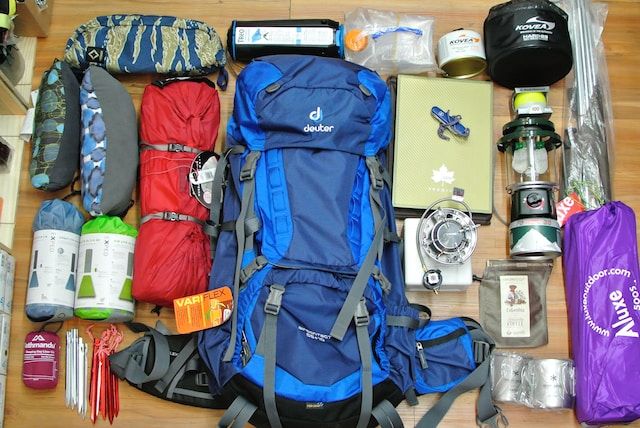
Personal Items
When packing for camping, it's easy to forget some essential things you might need. Remember to bring a toothbrush, toothpaste, and soap for personal hygiene. Also, consider packing a microfiber towel for quick drying and a hat for sun protection.
Shelter and Bedding
Shelter and bedding items are crucial for a comfortable camping experience. A frequently forgotten essential is tent stakes. Make sure to pack enough to properly secure your tent to the ground. In addition to your tent and sleeping bag, remember to bring a sleeping pad for added insulation and comfort.
Here are my suggestions on the best sleeping pads for camping and car camping.
Food and Cooking
For food and cooking essentials, it's important not to overlook items such as matches or a lighter for starting a campfire. Additionally, don't forget utensils for cooking and eating when using a camping stove if you plan to prepare your meals at the campsite.
Safety and First Aid
Safety and first aid are top concerns when camping. A first aid kit is a commonly overlooked item that should DEFINITELY be part of your camping gear. Choose a kit that includes bandages and other supplies to treat minor wounds and injuries.
Also, make sure to pack a flashlight or headlamp to navigate the wilderness safely after dark. It's a good idea to bring extra batteries in case your lighting devices run out of power.
Tools and Miscellaneous
A variety of tools and miscellaneous items can enhance your camping excursion. A reliable knife is crucial for cutting and doing basic outdoor tasks. Don't forget to bring duct tape as it has multiple uses on a camping outing, such as fixing tents or gear.
Clothing Recommendations

When camping, it's essential to dress appropriately for the conditions, as well as to pack extra clothing to stay comfortable during your adventure. Here are some clothing recommendations to ensure you have everything you need for your trip:
Hats: A suitable hat is important for both sun and cold protection. A wide-brimmed hat or cap will provide ample shade and shelter your face, neck, and ears from the sun during hot weather. In colder conditions, a beanie or thermal hat can help retain body heat and keep your head warm.
Extra Clothing: It's wise to pack extra clothing to account for changes in temperature and weather conditions. This includes extra socks, underwear, and shirts. By doing so, you can change into dry clothes if you become wet from rain or sweat, helping you avoid hypothermia and maintain a comfortable body temperature.
Merino Wool: Merino wool is an excellent material for outdoor clothing, particularly for camping. It is known for its ability to both insulate and wick away moisture from your body, keeping you warm and dry in various conditions.
Consider including merino wool garments such as socks, base layers, sweaters, or scarves in your camping attire.
Base Layers: Base layers are the foundation of an effective clothing system for any outdoor activity. They wick away moisture from your skin to keep you dry and comfortable all day.
Choose materials such as polyester, merino wool, or silk as they offer excellent performance qualities while avoiding cotton, which can absorb moisture and cause chills.
Opt for lightweight, quick-drying, and breathable base layers for warmer weather, and thicker, insulating base layers for colder conditions.
By following these clothing recommendations, you'll be well-prepared for your camping excursion. Remember to check the weather forecast before your trip and adapt your clothing choices accordingly to ensure a safe, enjoyable outing.
Personal Hygiene and Toiletries

Maintaining personal hygiene while camping is essential to stay comfortable and healthy during your outdoor adventure. Packing the right toiletries and hygiene items can make a significant difference in your camping trip.
Toilet paper is an indispensable item for any camping outing – it's not just for the restroom, but also for cleaning up spills and wiping your hands.
Always pack extra rolls in waterproof bags to keep them dry and clean. And don't forget to dispose of used toilet paper responsibly in designated waste containers or use biodegradable products suitable for the environment.
In addition to toilet paper, bring along a selection of other toiletries to cover your basic needs. These may include toothbrushes, toothpaste, soap, travel-sized shampoo and conditioner, and a compact razor.
Keeping these items in a zippered toiletry bag will help you stay organized and prevent leakage in your backpack or storage containers.
Baby wipes are incredibly versatile and can make freshening up a breeze. They are perfect for cleaning your hands, face, and body when you don't have access to running water or a proper shower.
Additionally, baby wipes serve as a quick yet gentle cleaning solution for camping utensils and equipment. Make sure to choose a biodegradable and unscented pack, as they are better suited for sensitive skin.
Finally, don't forget to pack a couple of towels for your camping adventure. Choose quick-drying, lightweight microfiber towels, as they are absorbent and compact, making them an ideal choice for camping.
These towels can be used not only to dry off after a swim or shower but also as extra seating or padding around your camping area.
Outdoor Safety and Protection

Camping trips offer the opportunity to explore the beauty of nature and spend time with friends and family. However, it's crucial to prioritize safety and protection when spending time outdoors.
This section will discuss essential items required for outdoor safety and protection, including trash bags, insect repellent, sunscreen, and measures to protect against mosquitoes and ticks.
Trash Bags are necessary for keeping your campsite clean and environmentally friendly. Not only do they help in maintaining the campsite's hygiene, but they also ensure you leave no trace behind.
Always pack enough trash bags to handle your waste, and dispose of them properly at the campsite. This simple practice helps protect the environment and preserve nature for future generations.
Insect Repellent is a must-have item for any camper. Mosquitoes, ticks, and other insects can pose a health risk by spreading diseases like West Nile virus, Lyme disease, and Zika virus.
Applying a bug spray with a high concentration of active ingredients like DEET or picaridin will help keep insects at bay. Regularly reapply the repellent as needed, especially after swimming or excessive sweating. Remember to follow the product's instructions for safe and effective application.
Sunscreen is critical for protecting your skin from the sun's harmful UV rays. Choose a broad-spectrum sunscreen with an SPF of at least 30, which will block both UVA and UVB rays.
Apply the sunscreen generously, paying particular attention to often-overlooked areas like your ears, neck, and the backs of your hands. Reapply every two hours or more frequently if you're swimming or sweating heavily. Don't forget to protect your lips by using a lip balm with SPF as well.
Being mindful of potential hazards from mosquitoes and ticks is important for outdoor safety. Mosquitoes are more prevalent around dawn and dusk, so plan your activities accordingly and use mosquito netting when necessary.
To protect against ticks, wear long sleeves, tuck your pants into your socks, and use a tick repellent…especially when in or around heavy brush or densely wooded areas.
After spending time outdoors, inspect your body (and pets) for any ticks and remove them properly if found.
Backup Camping Gear and Spare Items
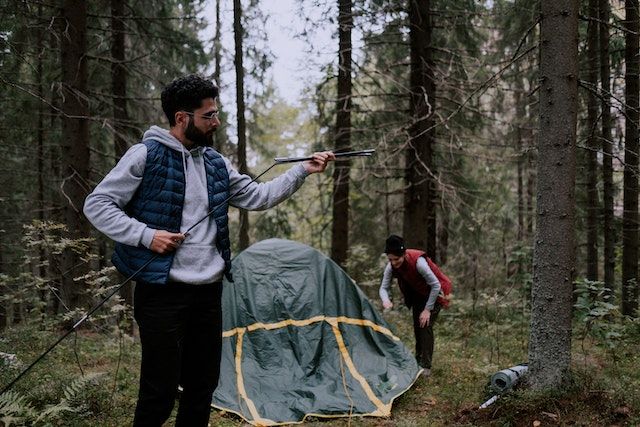
A big part of the camping preparation process involves bringing along backup equipment and spare items.
Trust me, getting to your destination, setting up camp, and then realizing that you forgot a much-needed piece of gear equals stress city. Avoid this!
Spare batteries are important for any battery-operated devices you might be using, such as flashlights, headlamps, or GPS units. Always pack extra batteries compatible with your devices to avoid getting stranded in the dark or losing navigation capabilities.
Lighters or fire starters are critical, as fire provides warmth, a cooking source, and a sense of security. Always bring spare lighters or a pack of matches in a waterproof container, in case your main fire starter fails or gets wet.
A spare tent pole is a valuable precaution, particularly on extended camping stays. Tent poles can sometimes break or become damaged, rendering the tent unusable. Carrying a spare tent pole can prevent a ruined trip and ensure you always have a shelter available.
If you don’t have a spare tent pole, a quick fix would be wrapping the broken one with duct tape or Flex Seal tape.
Packing additional sources of energy is crucial when camping, especially if you have devices that require charging.
A portable power bank or solar charger can help keep your devices powered up and functional during the trip.
Ensuring you have backup equipment and spare items on hand is smart camping. From spare batteries and lighters to extra tent poles and energy sources, being prepared for the unexpected will help keep you on the side of safety.
Navigational Aids
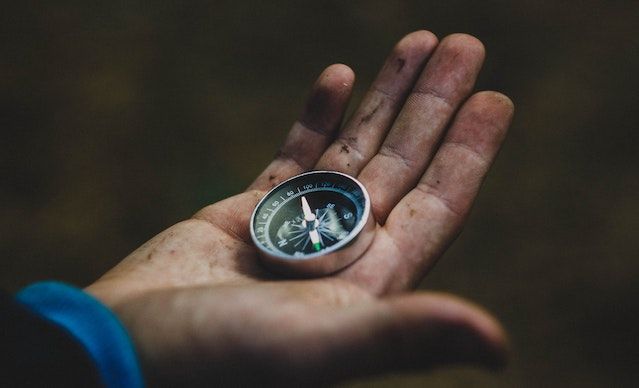
A vital but often overlooked aspect of camping equipment is navigational aids. These tools can greatly enhance your outdoor experience and ensure you do not get lost or disoriented during your trip.
In this section, I’ll discuss various forms of navigation aids, such as GPS devices, cell phones, and radios, which can be extremely beneficial when venturing into the wilderness.
GPS devices have become increasingly popular in recent years, offering precise location information and detailed topographic maps.
These devices can be handheld or integrated into a smartphone, with many models featuring waterproof and rugged designs specifically tailored for outdoor use. With a reliable GPS device, you can confidently explore your surroundings and quickly find your way back to camp.
Cell phones can also double as navigational aids, as they often come equipped with GPS and map applications. However, before relying on your phone for navigation, keep in mind that cellular coverage may not be available in remote areas.
Also, ensure your phone is fully charged and protected from the elements. Consider downloading offline maps and investing in a power bank for backup.
Radios are another valuable tool for communication and navigation when camping. Two-way radios or walkie-talkies provide an effective means of communication between group members, especially when cell phone service is unavailable.
Some radios also come with built-in weather alerts, ensuring you stay informed about any potential changes in weather conditions.
A combination of GPS, cell phone, and radio can significantly improve your outdoor experience and provide peace of mind when exploring unfamiliar trails and landscapes.
Tools and Utility Items
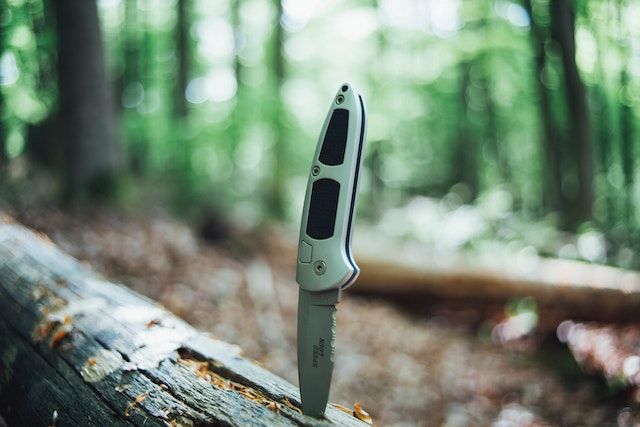
When it comes to tools and utility items, these sometimes get forgotten. But this is not a mistake you want to make when living in the outdoors for extended periods. The following gear will make life MUCH simpler:
Duct tape is a versatile item that should always be present in your camping supplies. It can be used for various things, such as securing a tent, repairing broken items, or even as an emergency bandage. Don't overlook this hiker's best friend.
A proper storage solution for your belongings will help you keep your camping space clean and organized. Bring along compact storage containers or bags to store your food, clothes, and other essentials. This will make it easier to find what you need when you need it.
If camping in bear country, be CERTAIN to lock your food and other scented items in bear-proof canisters or containers. These will usually be located near each site, with some type of signage posted to remind you.
A tent footprint helps protect the bottom of your tent from moisture, dirt, and potential punctures. It's an often-forgotten item that can significantly extend the lifespan of your tent.
If you don’t have a tent footprint, you can use a bedding sheet instead, or even a cheap polyethylene tarp.
Bringing a can opener and a hammer is always useful when camping. A can opener will help you prepare canned food, while a hammer or a mallet will come in handy for setting up your tent and driving stakes into the ground.
A heavy rock can be used in place of a hammer or mallet when driving tent stakes into the soil.
Having a simple toolkit with various items, such as a multi-tool, knife, small hatchet, and scissors is essential. Make sure to pack these items in an easily accessible location so you can quickly grab them when needed.
Don't forget a pair of sturdy tongs for cooking. These will make it easier to handle food on the grill, reducing the risk of burns or dropped meals.
Lightweight Furniture and Comfort Items
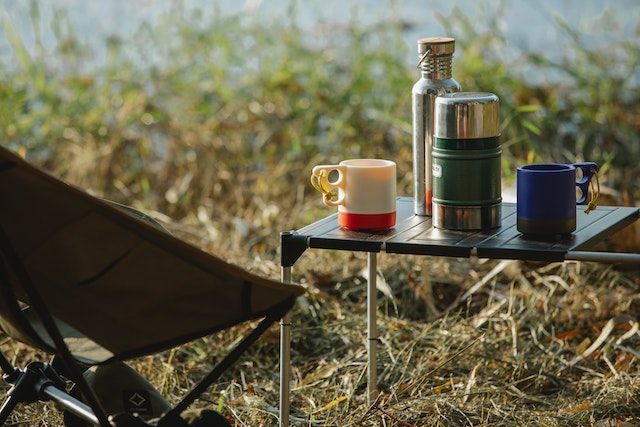
When camping, the goal is to be as comfortable as possible, even though you’re out in the wilderness.
On this note, bring along any outdoor furniture that helps make the adventure more enjoyable. You can’t rely on picnic tables and other luxuries, which may, or may not, be situated near your camping area.
Portable camping chairs and a camping table are a must-have for any camper. They provide a place to sit around the campfire, relax by the lake, or to lounge on when enjoying a meal.
There are many lightweight and collapsible options available that won't take up too much space in your pack or vehicle. Be sure to pack a few portable chairs on your next camping excursion!
Camping pillows may seem like glamping items, but they can make a big difference in ensuring a good night's sleep.
Many camping pillows are designed to be compact and lightweight, making them easy to pack without taking up too much space. Select a pillow that suits your personal comfort preference, whether it is inflatable, foam-filled, or a combination of both.
When it comes to sleeping bags, they are essential for enjoying quality shuteye. However, sleeping bags can sometimes be overlooked, especially when packing light or during warmer seasons.
Ensure you have an appropriate sleeping bag for the expected temperatures and conditions on your trip. Consider factors like insulation, shape (mummy or rectangular), and weight when choosing the right sleeping bag for your needs.
Don't let these forgotten items put a damper on your outdoor adventure.
Lighting Solutions for Camping
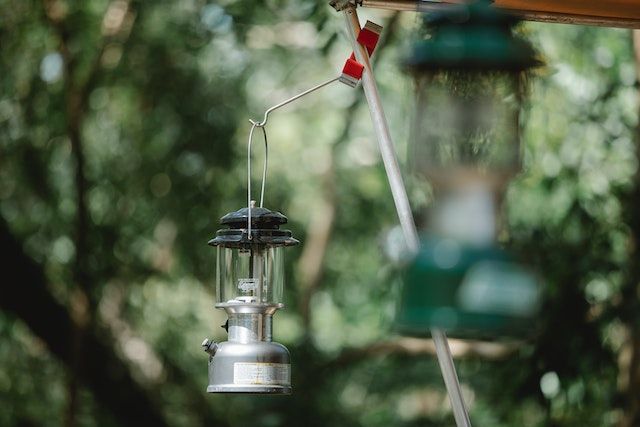
Without good lighting, camping at night can be a bummer. Having adequate lighting makes tasks like cooking and navigating around your campsite easier.
In this section, I’ll discuss a few lighting options you should consider bringing along…
Headlamps are essential for hands-free lighting, providing ease and convenience while performing camping tasks. They are perfect for bedtime reading, preparing meals, and nighttime hikes.
There are many headlamp models available on the market, but try to choose one with adjustable brightness levels and a comfortable strap.
Flashlights or torches should be other additions to your camping gear. They are easy to hold and control, making them ideal for emergencies or those times when you need a focused beam of light. Keep them handy in your backpack or pocket for easy access, and always remember to pack extra batteries.
In addition to headlamps and flashlights, lanterns are a popular lighting solution for illuminating your campsite. They create a welcoming atmosphere and can be hung or placed on a table to light up a larger area. Lanterns come in various styles and designs, including fuel-powered, battery-operated, and solar-powered options.
One innovative lighting solution to consider is inflatable solar lanterns. They are lightweight, simple to pack, and can withstand harsh weather conditions. These lanterns harness the sun's energy during the day and provide ample illumination at night.
To wrap up, headlamps, flashlights, lanterns, and inflatable solar lanterns are excellent options to guarantee a well-lit, safe, and enjoyable experience in the great outdoors.
Cooking Equipment and Campfire Essentials
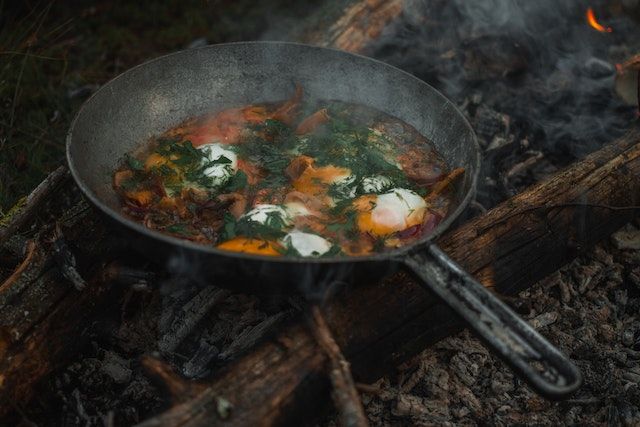
It's vital to have the right cooking equipment and campfire essentials. In this section, I’ll cover the key items you’ll need to eat like a king or queen…even in the middle of nowhere!
Camping cookware should include a variety of items, such as:
- Cast-iron skillet: Ideal for cooking over an open flame, a cast-iron skillet is an indispensable tool for preparing a variety of meals.
- Paring knife: Useful for cutting fruits, vegetables, and other ingredients, a paring knife is an essential camping cooking tool.
- Spatula, tongs, or a wooden spoon: These simple instruments will help you manage your food as it cooks.
- Nesting bowls, cutting boards, mugs, and plates: These items make eating and preparing food much simpler and organized.
- Cutlery: Any kind will do; plastic, metal, camping sporks, etc.
- Biodegradable dish soap and scrubbing brush: To maintain cleanliness, bring along biodegradable dish soap and a brush for easy cleanup.
In addition to cooking tools, campfire essentials are critical for a safe, fun camping experience. Some of the most important items include:
- Firewood and kindling: Make sure to have a supply of dry wood and small twigs or kindling to get your fire started and keep it burning.
- Lighter or matches: Waterproof matches or a sturdy lighter will help in starting your fire when needed.
- Flint fire starter: As a reliable alternative to lighters and matches, a flint fire starter can create sparks even if it gets wet or runs out of gas.
- Portable camping stove or grill: Should you be in an area with restrictions on open fires, a portable stove or grill with an appropriate fuel source offers a safe and convenient way to cook your meals.
Packing these cooking supplies and campfire essentials will make meal time and entertaining a breeze.
Frequently Asked Questions
What’s the list of the top commonly forgotten camping items?
When packing for a camping trip, some commonly overlooked items include tent stakes, duct tape, flashlights or headlamps, batteries, matches/lighters, water, an air pump, medications, and a first-aid kit.
While these are just some of the things you need, they are among the most important.
As a general rule, small items tend to be the most easily forgotten due to their size.
Which essential first aid items are often left behind?
First-aid kits are forgotten very often. Further, a kit should contain AT LEAST items such as band-aids, sterile gauze pads, adhesive tape, antiseptic wipes, tweezers, scissors, and pain relievers.
What sleeping gear do people usually forget?
While campers typically remember to bring a sleeping bag and pillow, they may forget essential items such as a sleeping pad or an air mattress for added comfort on the ground. It's also common for campers to overlook bringing an extra blanket, which is critical because if it gets cold you will not be a happy camper (no pun intended).
Which important cooking items are frequently missed?
When it comes to cooking, people often remember the basics like a camp stove, pots, and utensils. However, they may forget essentials like a can opener, cooking oil, aluminum foil, or matches/lighters for starting a fire.
It's also a good idea to bring extra fuel (propane or butane) for the camp stove and a small cutting board for food preparation. Don’t forget these on your next camping trip!
What personal hygiene items are often forgotten?
Maintaining personal hygiene when camping is important, yet people may neglect to pack items like travel-size toiletries (toothbrush, toothpaste, soap, shampoo), biodegradable toilet paper, hand sanitizer, a small pack towel, and a portable shower or water container for washing up. You need to bring these essentials for you and any other guests.
Which clothing items should not be overlooked while packing for camping?
While packing clothing items for camping, make sure to include moisture-wicking or quick-drying clothing, sturdy and comfortable footwear, extra socks, rain gear (waterproof jackets/ponchos), and a hat to protect against the sun. Additionally, pack a warm jacket or fleece for cooler evenings and ensure you have enough layers to accommodate changing weather conditions.
What are fun things to bring camping?
Some of the simplest things are often the most fun…especially if used in the company of a larger group. Items like a deck of playing cards, dominos, board games, a frisbee, a football or soccer ball…even water guns are great to take camping.
Make sure to add these things to your list as they will help keep you entertained during down times. You’ll be thankful you did, especially if you have kids in tow!
What should you not bring camping?
In general, unless something is absolutely necessary, stay away from larger, bulky, heavier items that take up space. These things will be a pain to pack, unpack, carry around, etc.
What should I bring to camp at night?
Among the other items listed here, a lantern and/or headlamp is critical for you and anyone else in your party. Many camping areas are poorly lit at night - if they have lighting at all - so you’ll definitely want to bring these along. Make sure to bring extra batteries also, in order to power the devices.
Should I bring firewood on my camping trip?
It depends. First, are campfires allowed where you’ll be staying? Make sure ahead of time by calling the campground or checking online, as there could be fire restrictions in place due to weather conditions, droughts, etc.
Second, when calling ahead or checking online, be certain to ask if they have a general store on the property, and if they sell firewood. If the location does not, you’ll have to bring your own, or visit a store that’s located near the campground to buy some.
Final Thoughts
Whether you’ll be tent camping or car camping, it is essential to double-check your camping list of items before embarking on your trip. To recap, these are a just a few of the most easily forgotten items:
- Tent stakes: Having enough tent stakes will help to properly secure your tent to the ground, preventing any unexpected troubles, especially during windy conditions.
- Pillows: Don't rely on your backpack or clothes as a makeshift headrest, as bringing a proper pillow will ensure better sleep and comfort during your camping nights.
- Flashlights and headlamps: Campsites can get dark after sundown, so pack a flashlight or headlamp with extra batteries to avoid getting lost or being unable to perform tasks in low-light conditions.
- Batteries & Matches/Lighters: These items you may wish to bring multiples of to light fires and power all of your electronics.
- Medications: Do NOT leave home without these!
- First-aid kit: Stuff happens. Be prepared at all times with the basic emergency supplies.
- Water: Bring an ample supply to last for your entire trip, for you and any other guests.
While this list covers a wide range of gear, I cannot stress enough that these are just the most commonly forgotten items, and there may be other belongings you’ll need based on your specific plans, personal preferences, etc.
Don’t ruin your camping expedition because necessary items were left at home. Be sure that nothing important gets left behind, and you’ll have a much better time when enjoying the outdoors. Happy camping :)
LIVE WISELY, LIVE WELL!

